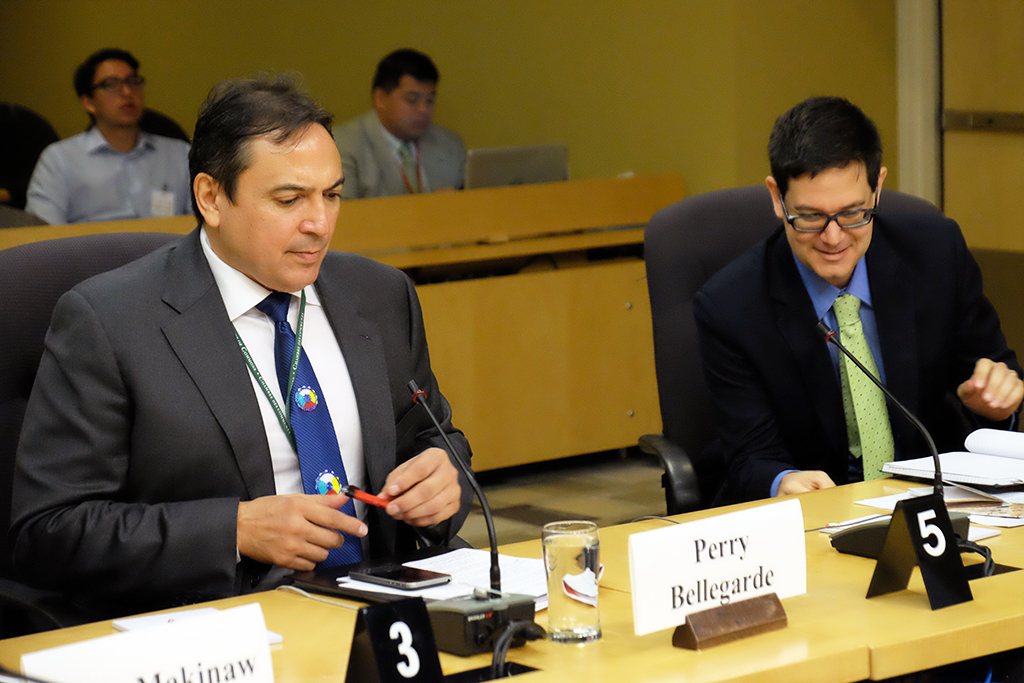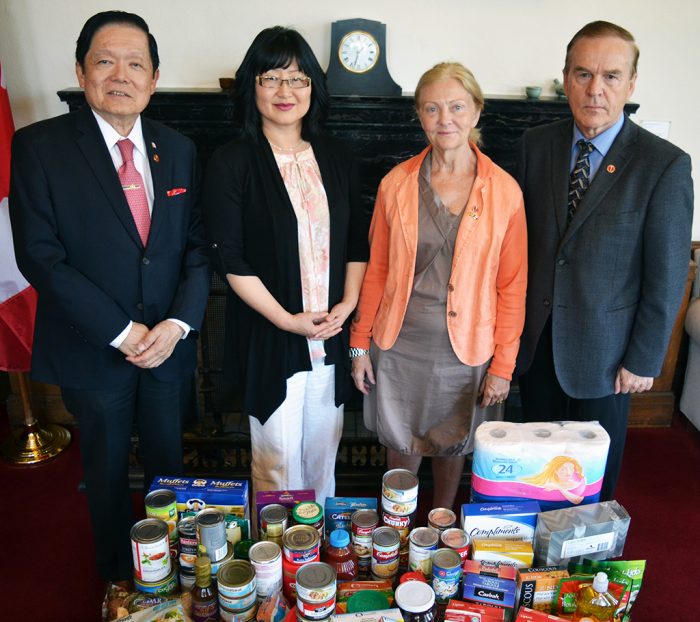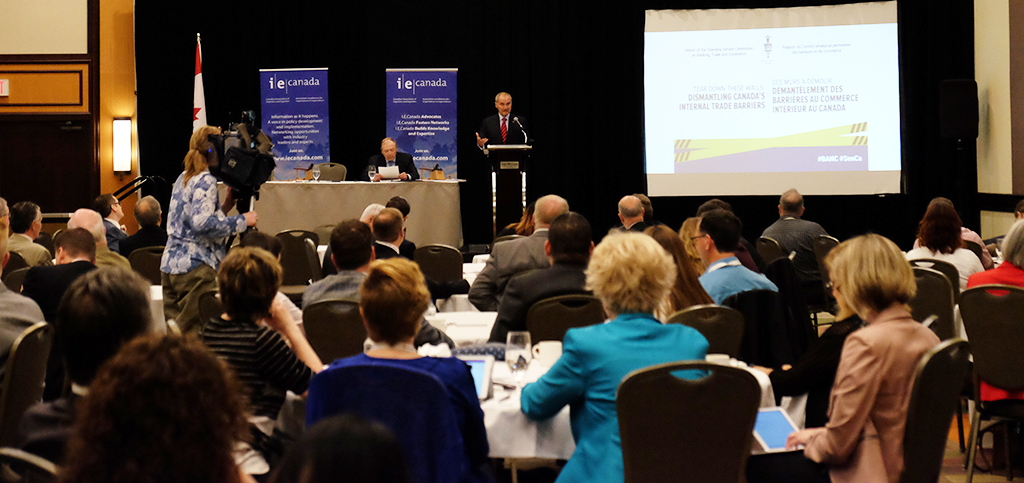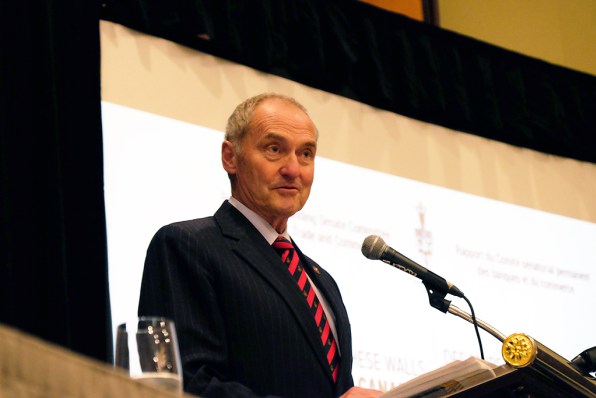Week in Review: June 13 – 17, 2016



A Fair Deal for the RCMP
On Tuesday, members of the Senate Committee on National Security and Defence unanimously adopted amendments to Bill C-7, An Act to amend the Public Service Labour Relations Act, the Public Service Labour Relations and Employment Board Act and other Acts and to provide for certain other measures.
“The amendments adopted by the committee reinforced the management powers conferred on the Commissioner of the Royal Canadian Mounted Police by the RCMP Act; removed the limitation on collective bargaining; expanded the scope for grievances which may be brought forward by members; and promoted the right to a secret ballot during the unionization process,” said Senator Daniel Lang, committee chair.

Pictured: Bob Paulson speaks to media after appearing at the Senate Committee on National Security and Defence.
“With these amendments, the committee has sought to ensure the bill is in alignment with meaningful collective bargaining rights for all members and employees of the RCMP,” added Senator Mobina Jaffer, committee deputy chair.
This review comes after the committee agreed last week to extend public hearings to hear from several high-profile witnesses, including RCMP Commissioner Bob Paulson.
National Chief Perry Bellegarde Talks Pipelines & Balance with Senators
Assembly of First Nations National Chief Perry Bellegarde appeared before the Senate Committee on Transport and Communications on Tuesday as part of a study on pipelines.
“Fourteen chiefs are oil and gas producers and want to get their product to market,” Chief Bellegarde said.
“Then you have some chiefs who want to look at equity ownership in pipelines. Some chiefs say that the pipelines will cut across their traditional territory lands so they’re looking at a tax. … Some are engaging in that system while others are simply saying no. It’s a balance with respect for the right to say yes and the right to say no.”
Balance was a key part of Chief Bellegarde’s testimony.
“Are we going to choose the environment over the economy or the economy over the environment?” he asked.
“It’s finding balance… That’s the most important thing.”

Pictured: National Chief Perry Bellegarde discusses pipelines at Senate Committee on Transport and Communications.
Senator Betty Unger also contributed to this balanced perspective.
“There are more than 1,700 Aboriginal people in permanent jobs at the oil sands. Over the past 14 years, Aboriginal companies have earned over $8 billion in revenue through working relationships in the oil sands. In 2011 and 2012, oil sands companies contributed more than $20 million to Aboriginal communities in that area,” she said.
Senator Art Eggleton wanted to know how the process of pipeline development might be made more inclusive.
“Is there anything else you think could be done that would take you from being a bystander to a more central part of the action, where you are more aware of what is going on and where your input garners more respect?” Senator Eggleton asked.
Beyond advocating for an indigenous presence on the National Energy Board, Chief Bellegarde suggested that dialogue and negotiation should take place regarding resource extraction — a step-by-step cooperative approach that would also discuss employment and benefit.
“Before you try to build anything, build a respectful relationship with indigenous people and governments,” Chief Bellegarde said.


Assisted Dying Bill : Adopted
The Senate passed the bill on medical assistance in dying by a vote of 44 to 28 on Friday, June 17, 2016, capping nearly two weeks of intense, passionate and principled debate.
Senators made seven amendments to Bill C-14, including extending eligibility for medical assistance in dying to people for whom death is not reasonably foreseeable.
The House of Commons accepted some of the Senate amendments but rejected the broadened eligibility criteria despite concerns that this would render Bill C-14 unconstitutional.
On Friday, senators spoke from their hearts about their deep conflict over whether or not to support the bill.
Senator Serge Joyal, in particular, delivered a scorching criticism of the bill but Senator Don Plett noted the quality of debate in the Red Chamber.
“We truly voted our conscience, colleagues,” Senator Plett said. “I thank you for that.”
Bill C-14 can now go for Royal Assent and become law.
Click here to read the full list of amendments to Bill C-14.
Senate QP: Minister of International Trade Chrystia Freeland
Senators challenged Minister of International Trade Chrystia Freeland to explain how she will protect Canada from waves of international protectionism and buoy Canadian exports during Question Period in the Senate on Tuesday, June 14, 2016.


Prize winner meets hero, Senator Sinclair
Photo: Senator Sinclair meets with Jeremy Hornung, who wrote an award-winning essay about the senator.
Jeremy Hornung, a 12-year-old boy from Ottawa, recently met with Senator Murray Sinclair — the man who inspired his award-winning essay.
The boy is this year’s Grand Prize Winner of the national Lives That Make a Difference essay contest, hosted by A&E Networks.
The A&E contest has run for more than a decade; each year about 2,000 students in grades 5 to 12 submit essays for a chance to win $3,000. This year, essays about Indigenous issues were particularly prevalent and many contestants were drawn to Senator Sinclair for his work in advancing Indigenous causes.
Senators collect donations for Ottawa Food Bank

Senators Victor Oh, Yonah Martin, Carolyn Stewart Olsen and Percy Mockler collected donations for the Ottawa Food Bank from Monday, June 6 to Friday, June 17, 2016.


Senators Unveil Internal Trade Barriers Report at Importers-Exporters Conference
Mind-boggling rules, dueling bureaucracies and maddening regulations are estimated currently to sap billions of dollars from the Canadian economy each year, the Senate Committee on Banking, Trade and Commerce has found.
Senators released an extensive report on internal barriers to trade called Tear Down These Walls: Dismantling Canada’s Internal Trade Barriers today in the context of Canadian Importers and Exporters Association’s (I.E.Canada) 85th annual conference. Senators David Tkachuk and Joseph Day were there to present the rapport and answer questions.


Photo: Senators Joseph Day (left) and David Tkachuk (right) speak about the Internal Trade Barriers Report at a press conference in Ottawa.
The federal government must make removing these barriers a priority, the committee concluded — if the government fails to act, the cost to Canada’s gross domestic product could range between $50 billion to $130 billion.
Reducing internal barriers to trade is particularly important now. The United States — Canada’s biggest trading partner — is soon to elect a new president who might be less receptive to trade with Canada. Moreover, the ramifications of the United Kingdom’s possible exit from the European Union are unclear. Making trade within Canada easier will provide a measure of insurance against potential hits to international trade.
Related articles
Tags
Committee news
Week in Review: June 13 – 17, 2016



A Fair Deal for the RCMP
On Tuesday, members of the Senate Committee on National Security and Defence unanimously adopted amendments to Bill C-7, An Act to amend the Public Service Labour Relations Act, the Public Service Labour Relations and Employment Board Act and other Acts and to provide for certain other measures.
“The amendments adopted by the committee reinforced the management powers conferred on the Commissioner of the Royal Canadian Mounted Police by the RCMP Act; removed the limitation on collective bargaining; expanded the scope for grievances which may be brought forward by members; and promoted the right to a secret ballot during the unionization process,” said Senator Daniel Lang, committee chair.

Pictured: Bob Paulson speaks to media after appearing at the Senate Committee on National Security and Defence.
“With these amendments, the committee has sought to ensure the bill is in alignment with meaningful collective bargaining rights for all members and employees of the RCMP,” added Senator Mobina Jaffer, committee deputy chair.
This review comes after the committee agreed last week to extend public hearings to hear from several high-profile witnesses, including RCMP Commissioner Bob Paulson.
National Chief Perry Bellegarde Talks Pipelines & Balance with Senators
Assembly of First Nations National Chief Perry Bellegarde appeared before the Senate Committee on Transport and Communications on Tuesday as part of a study on pipelines.
“Fourteen chiefs are oil and gas producers and want to get their product to market,” Chief Bellegarde said.
“Then you have some chiefs who want to look at equity ownership in pipelines. Some chiefs say that the pipelines will cut across their traditional territory lands so they’re looking at a tax. … Some are engaging in that system while others are simply saying no. It’s a balance with respect for the right to say yes and the right to say no.”
Balance was a key part of Chief Bellegarde’s testimony.
“Are we going to choose the environment over the economy or the economy over the environment?” he asked.
“It’s finding balance… That’s the most important thing.”

Pictured: National Chief Perry Bellegarde discusses pipelines at Senate Committee on Transport and Communications.
Senator Betty Unger also contributed to this balanced perspective.
“There are more than 1,700 Aboriginal people in permanent jobs at the oil sands. Over the past 14 years, Aboriginal companies have earned over $8 billion in revenue through working relationships in the oil sands. In 2011 and 2012, oil sands companies contributed more than $20 million to Aboriginal communities in that area,” she said.
Senator Art Eggleton wanted to know how the process of pipeline development might be made more inclusive.
“Is there anything else you think could be done that would take you from being a bystander to a more central part of the action, where you are more aware of what is going on and where your input garners more respect?” Senator Eggleton asked.
Beyond advocating for an indigenous presence on the National Energy Board, Chief Bellegarde suggested that dialogue and negotiation should take place regarding resource extraction — a step-by-step cooperative approach that would also discuss employment and benefit.
“Before you try to build anything, build a respectful relationship with indigenous people and governments,” Chief Bellegarde said.


Assisted Dying Bill : Adopted
The Senate passed the bill on medical assistance in dying by a vote of 44 to 28 on Friday, June 17, 2016, capping nearly two weeks of intense, passionate and principled debate.
Senators made seven amendments to Bill C-14, including extending eligibility for medical assistance in dying to people for whom death is not reasonably foreseeable.
The House of Commons accepted some of the Senate amendments but rejected the broadened eligibility criteria despite concerns that this would render Bill C-14 unconstitutional.
On Friday, senators spoke from their hearts about their deep conflict over whether or not to support the bill.
Senator Serge Joyal, in particular, delivered a scorching criticism of the bill but Senator Don Plett noted the quality of debate in the Red Chamber.
“We truly voted our conscience, colleagues,” Senator Plett said. “I thank you for that.”
Bill C-14 can now go for Royal Assent and become law.
Click here to read the full list of amendments to Bill C-14.
Senate QP: Minister of International Trade Chrystia Freeland
Senators challenged Minister of International Trade Chrystia Freeland to explain how she will protect Canada from waves of international protectionism and buoy Canadian exports during Question Period in the Senate on Tuesday, June 14, 2016.


Prize winner meets hero, Senator Sinclair
Photo: Senator Sinclair meets with Jeremy Hornung, who wrote an award-winning essay about the senator.
Jeremy Hornung, a 12-year-old boy from Ottawa, recently met with Senator Murray Sinclair — the man who inspired his award-winning essay.
The boy is this year’s Grand Prize Winner of the national Lives That Make a Difference essay contest, hosted by A&E Networks.
The A&E contest has run for more than a decade; each year about 2,000 students in grades 5 to 12 submit essays for a chance to win $3,000. This year, essays about Indigenous issues were particularly prevalent and many contestants were drawn to Senator Sinclair for his work in advancing Indigenous causes.
Senators collect donations for Ottawa Food Bank

Senators Victor Oh, Yonah Martin, Carolyn Stewart Olsen and Percy Mockler collected donations for the Ottawa Food Bank from Monday, June 6 to Friday, June 17, 2016.


Senators Unveil Internal Trade Barriers Report at Importers-Exporters Conference
Mind-boggling rules, dueling bureaucracies and maddening regulations are estimated currently to sap billions of dollars from the Canadian economy each year, the Senate Committee on Banking, Trade and Commerce has found.
Senators released an extensive report on internal barriers to trade called Tear Down These Walls: Dismantling Canada’s Internal Trade Barriers today in the context of Canadian Importers and Exporters Association’s (I.E.Canada) 85th annual conference. Senators David Tkachuk and Joseph Day were there to present the rapport and answer questions.


Photo: Senators Joseph Day (left) and David Tkachuk (right) speak about the Internal Trade Barriers Report at a press conference in Ottawa.
The federal government must make removing these barriers a priority, the committee concluded — if the government fails to act, the cost to Canada’s gross domestic product could range between $50 billion to $130 billion.
Reducing internal barriers to trade is particularly important now. The United States — Canada’s biggest trading partner — is soon to elect a new president who might be less receptive to trade with Canada. Moreover, the ramifications of the United Kingdom’s possible exit from the European Union are unclear. Making trade within Canada easier will provide a measure of insurance against potential hits to international trade.


